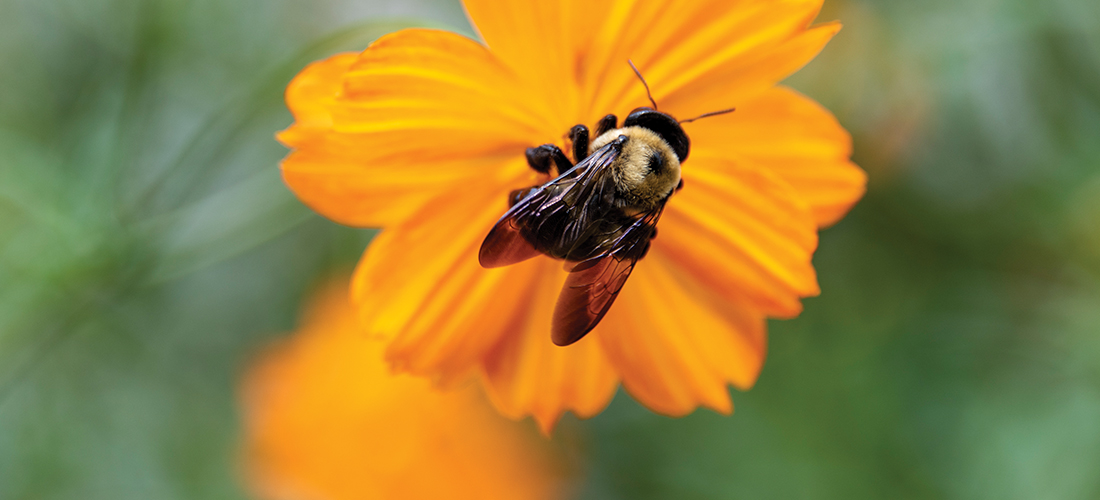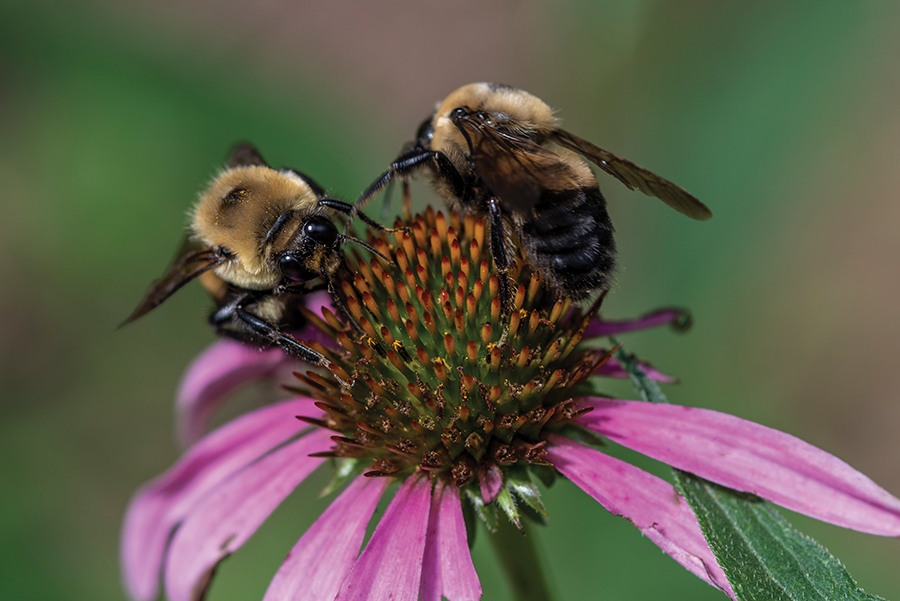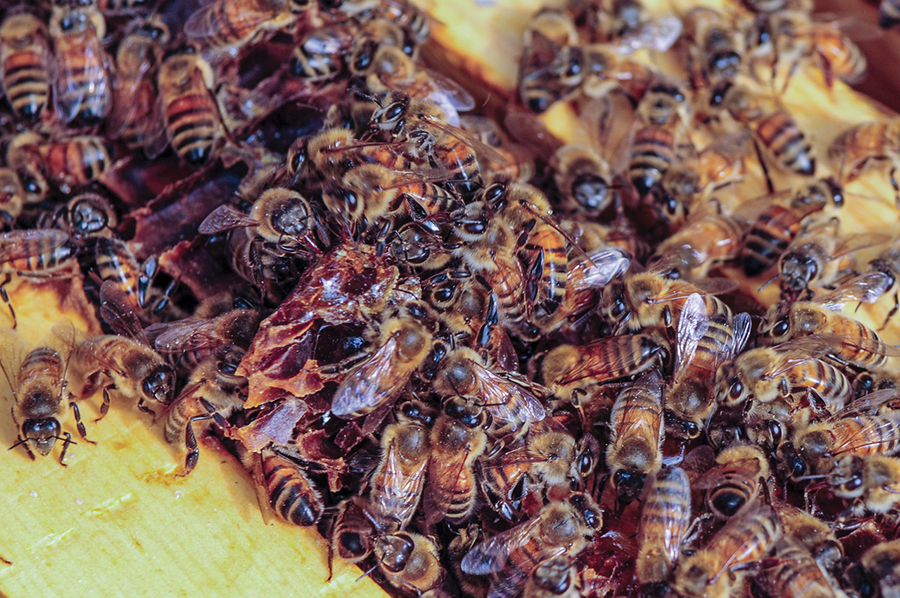
The Secret Lives of Beekeepers
Once they catch “bee fever,” sweet fulfillment is theirs
By Cynthia Adams

Ah, hive sweet hive! Nobody runs a tighter ship, nor a more orderly home, than a hive of bees.
Bees are terrific housekeepers. Fiends for organization and hygiene, too. They even take out the trash (which may include the corpses of redundant queens or drones after killing them off).
Hives are a famous symbol of mathematical symmetry and order. Beekeepers cannot say enough about this.
But I digress.
Beekeeping is not easy. Easy is not the real reason people are drawn to the singular work, either.
Greensboro beekeeper Robert Jacobs stood demonstrating a glass-encased beehive at Bee Friendly to Pollinators Day at the N.C. Cooperative Extension Center on Burlington Road. Children seemed completely fascinated.
He patiently introduced all comers into the secret world of beekeepers, explaining what drew him there.
“I am a retired attorney,” says Jacobs, who only recently hung up his law license. It is safe to call beekeeping his passion. He teaches beekeeping for the Guilford County Beekeepers Association. Jacobs has been intrigued by bees since he can remember.
He grew up in Greensboro when he said the “town was quite different.” Through his reminiscence, Greensboro was a storied place where kids didn’t suffer from a nature deficit disorder — which is an actual thing for kids deprived of nature.
No siree. Jacobs was experiencing nature firsthand, playing and exulting in the natural world. He chose the Walt Whitman way versus the Walt Disney way.
“Even as a kid, friends and all, would look for hornets’ nests,” Jacobs recalls fondly. “A friend at the back, had a fence and one of his neighbors had bees. We would sit and watch the honeybees.”

In 2007, Jacobs took the beginner beekeeping course offered at the Guilford Center. He began buying local honey from a Guilford beekeeper.
Then he got his own bees. By the way, most of them come from Georgia, arriving by mail.
Let us bee mindful. The ancients immortalized the embattled Apis mellifera, otherwise known as the honeybee, on coins, crests and jewelry.
Napoleon Bonaparte, Albert Einstein and Winnie the Pooh were big fans. Bonaparte’s crest was embellished with a bee. Einstein predicted disaster if the bee were lost. Pooh’s very first story pondered the “wrong sort of bees.”
We massage beeswax onto our nail cuticles and buff it onto our furniture. Slip an elegant beeswax candle onto the table. Slather honey onto our morning toast.
Bees pollinate more than one third of all food sold, including more than 100 crops in the United States.
Singly responsible for billions of dollars in American food production, the honeybee’s industriousness is worth over $20 billion annually. They transfer the pollen from the anthers of a flower to the stigma of the same or different flower. The process must occur during a fixed period known as “receptivity.” Seedless watermelon flowers, for example, are receptive for only one day.
While bees once showed up as a matter of course, desperate farmers now resort to renting bees for pollination. They truck in colonies to pollinate flowering trees, vineyards and crops lacking sufficient indigenous bees.
In the United States, 80 percent of the wild honeybees have been lost. The reasons include colony collapse disorder, mites, insecticides and fungicides.
Fortunately, there are beekeepers at work, battling to save the honeybee. .
“The more beekeeping I did, the less practicing law I did,” admits Jacobs. “My clients knew if the front door was closed, a swarm was on. I call-forwarded my office phone to my cell as I was winding down the practice.”
Sure, he found the law interesting, Jacobs says. But there was something about beekeeping that was endlessly fascinating.
“I’ve seen in bee publications in the late 1800s, an affliction referred to as ‘bee fever.’ That’s what I’ve got.”
Bee fever is real. Something frets him, Jacob says, but now it isn’t a pending trial or court date for a client. What concerns him is his clean windshield.
“When was the last time you drove your car out of the city and had to clean your windshield from insects?” he asks. “Over the last several years, I haven’t had to do that.”
Jacobs is a reader, but if you ask the title of his favorite book there is no hesitation: A Practical Treatise on the Hive and the Honey Bee by Lorenzo Langstroth, who “realized the significance of bee space” and developed the concept of movable frames that are so common today. There is a considerable body of literature concerning bee behavior. Jacob knows only too well and has been working his way through it as fast as possible.
“You can never know everything,” Jacob sighs. “And I am constantly making adjustments in what I’m doing and trying to figure out what the bees will do. The late Dr. Ambrose at N.C. State said something like, ‘If we think one thing, and the bees think something else, they are right.’” He adds wryly, “Bees may do things this way because this is what bees do . . . or, the opposite”
Not everybody is cut out to be a beekeeper, Jacobs mentions. You will know within a couple of years, he inserts.
Minta Phillips, a retired radiologist, keeps hives on her Julian farm.
“What interests me about beekeeping is that I love the bees, and it comes from so many influences.” Like Jacobs, she harks back to her childhood, when her maternal grandmother and mother “didn’t want to squish a bug.” They imparted a sense of connection with the natural world, and a reverence.
She was never instilled with a fear of insects or bees.
“There was a misunderstanding in remote times about bees,” she reflects, “And an interest to steal their honey. So ancient coins bore the sign of the bee, as things important to early man.
“If we focus on what’s really challenging pollinators now,” she continues, “it’s often taught at the Guilford County Beekeeping Association that the No.1 detriment is the beekeeper! We can kill them out of misinformation.”
What led her to keep hives?
“My parents were at end of life. And a social worker, Camille, at Well-Spring [Retirement Community], was a beekeeper. I found it interesting to talk with her. She told me about the January beginner’s event [for beginning beekeepers].”
Phillips took the beginner’s course to satisfy her intellectual curiosity. She also made friends. “Beekeepers in Guilford county are a varied type of people.”
Phillips ordered two packages of bees as starter hives and became a new beekeeper. A starter hive costs roughly $200.
“They weigh out a package of three pounds of bees — containing 15,000-20,000 bees. And a queen in a separate chamber.”
She describes the particulars; how the bees gather pollen and make “bee bread which is packed inside the comb.” The queen is in the center, laying eggs. The worker bees feed the eggs and cap the “cells.” The outside of the frame is capped honey. She also mentions the queen’s pheromones, having a pleasant scent she likens to lemongrass.
Her mentor is fellow beekeeper Curt Bower. She also relies heavily upon Charles Black, a retired electrician who grew up on a dairy farm in Guilford County.
“He has a reverence for bees. Charles is just amazing. Again, he’s not afraid, loves bees and marvels at this little creature,” she says.
“I’m more interested in the bees than honey,” Phillips admits. “In my fifth year, I have not extracted honey. I’ve kept it for the bees.” Like others, she experienced colony collapse from bee mites.
She looks forward to the development of a genetically “hygienic bee” that can resist mite infestation, which has decimated so many hives.
Phillips is also an artist who earned a degree in art at Yale before attending medical school at Harvard. She has painted bee-related pieces shown in art shows. One show benefitted the Friends School.
“The symmetry of the cells is a biologic efficient, an evolved (form of) wisdom.”
Raising bees requires constant vigilance, but she finds that spring is really fraught with concerns.
There is the persistent worry of a swarm. “In the spring, I reorder frames. If they are going to swarm, the beekeeper can lose half their bees.” Her goal is to “fool the bees and make them think they have more space so they won’t swarm.”
Even so, it has happened. But in April, she added a colony after putting up a bee box with a tiny wooden hive and a “lure treated with bees wax and essential oil.”
Phillips plants wildflowers and pollinator friendly plants on her bucolic farm and is on an alert list when nearby farmers spray chemicals.
She worries about drenching “rain bombs” which can wash out bees and kill them. In late winter, she lost two hives to early warmth that reverted to severe cold.
Overall, there is only a 50 percent survival rate. Last year alone, bee keepers lost 40 percent of their colonies, according to a survery from the Bee Informed Partnership
Two years ago, Phillips noticed an ad in the American Bee Journal for the American Congress for beekeepers in Cuba. She made the trip, visiting bee yards and watching oxen-drawn carts. However disadvantaged, the Cubans united with their global visitors in saving the honeybee.
“We looked at the survival of bees and how to do it” she says. “For example, the propolis, an antimicrobial made from the resin in pine is used to caulk everything in the hive. Vets and human medics looked at propolis as an antimicrobial salve.”
Since Cuba, Phillips has attended the N.C. Bee Conference and meeting in Hendersonville last year to hear Cornell’s beekeeper Tom Sealy.
She worries about the vicissitudes of climate change. “That’s kind of the plight of the honeybee.”
Phillips adds sadly, “Maybe they’re the canary in the coal mine.” OH
Cynthia Adams reported on colony collapse disorder a decade ago. She has the distinction of having a bee fly into her mouth and sting her tongue while eating outdoors. Despite that, she values bees and beekeepers. According to the USDA, “a honey bee colony is worth 100 times more to the community than to the beekeeper—meaning the value they deliver extends well beyond their actual price.”
The Guilford County Beekeepers Association meets on the second Tuesday of each month in the barn kitchen meeting room at 3309 Burlington Road. Contact Rob Jacobs at (336) 740-1703 or robertjjacobs@aol.com for information. The course cost for beginner beekeeping is $25 for individuals or $35 per family, which includes membership in the Guilford Beekeepers Association.





